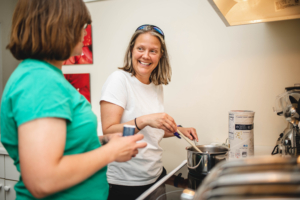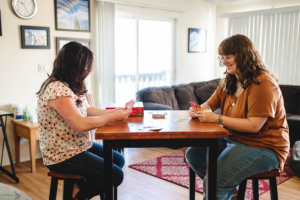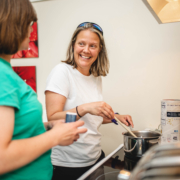Colorado Recovery’s New Independent Living Program
 One of the main treatment goals at Colorado Recovery is to have patients achieve a certain degree of social independence.
One of the main treatment goals at Colorado Recovery is to have patients achieve a certain degree of social independence.
Our recovery model is a holistic, patient-centered approach to mental healthcare. This model is based on the simple premise that it is possible to recover from a mental health condition. Not that long ago, schizophrenia, bipolar disorder, and similar severe mental health conditions were considered chronic and beyond the reach of any meaningful recovery.
“A central tenet of the recovery model is that empowerment of the user is important in achieving a good outcome in serious mental illness,” wrote the late Colorado Recovery founder Richard Warner in 2010.
The recovery model counteracts feelings of disempowerment and worthlessness in the patient. Its key tenets—“optimism about recovery from schizophrenia, the importance of access to employment, and the value of empowerment of user/consumers in the recovery process—are supported by scientific research,” wrote Warner in 2009. “Attempts to reduce the internalized stigma of mental illness should enhance the recovery process.”
Dr. Warner distinguished between “complete [psychiatric] recovery” and “social recovery,” which he defined in functional terms: economic and residential independence with low social disruption. Two important components of that are employment and independent housing.
A unique feature of our continuum of care allows clients to move to transitional housing and if they need more support they can move back to residential care at Balsam House for stabilization and then move back to transitional housing when ready.
From Transition to Independence
If they are doing really well they can now move on to the independent living program.
Bernadette Robinson is a life skills coach and transitional living coordinator at Colorado Recovery. “An assessment will be made by the treatment team to determine whether clients are ready for this level of care,” she says. “They would continue to be Colorado Recovery clients but may see a therapist only occasionally. One of the criteria is that they will continue to be involved in our organization in some way.”
 The new service starts with one apartment: one unit with three bedrooms. The accommodations are being offered to Colorado Recovery clients ready for this level of care. “A life skills assessment will determine whether they have the ability to clean and cook for yourselves, figure out transportation, can take care of their personal hygiene,” explains Robinson.
The new service starts with one apartment: one unit with three bedrooms. The accommodations are being offered to Colorado Recovery clients ready for this level of care. “A life skills assessment will determine whether they have the ability to clean and cook for yourselves, figure out transportation, can take care of their personal hygiene,” explains Robinson.
It’s a month-to-month lease allowing for maximum flexibility, so clients don’t have to commit to a whole year which may seem too overwhelming for them. “If patients run into problems down the line they can easily revert back to other levels of care like transitional living or even residential treatment if that is required,” says Robinson. “It would be an easy adjustment since they are already familiar with the Colorado Recovery system and its therapists.”
In fact, clients remain in the Colorado Recovery treatment orbit while in the independent living program—as long as they are working with a Colorado Recovery psychiatrist or therapist. It’s all part of our dynamic levels of care to support clients in the best way possible.
“We are quite flexible depending on where the person is,” says Peggy Caspari, Colorado Recovery’s executive director. “This flexibility is really empowering clients which is our core philosophy. We want to do what’s in their best interest and meet them where they are in their recovery.”
At Colorado Recovery it is our mission to help adults with serious mental health issues stabilize their illness, minimize symptoms, improve functioning and enhance each person’s social inclusion, quality of life, and sense of meaning in life.
If you have questions about our recovery model or our services to treat schizophrenia, bipolar disorder, and similar mental illnesses, call us at 720-218-4068 to discuss treatment options for you or the person you would like to help.





